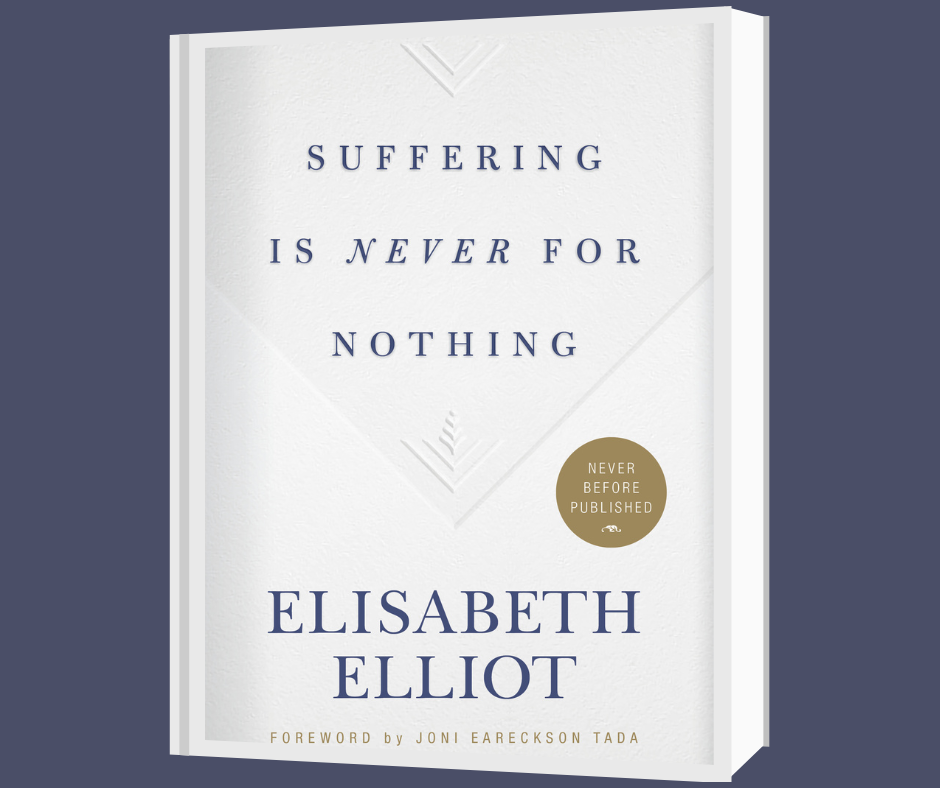Book Reviews
Suffering Is Never for Nothing, by Elisabeth Elliot | Review by Rosa Byler

This book came to me in a publishers’ bundle along with a new biography of Elisabeth Elliot. Naturally attracted to a story rather than a treatise on a difficult subject, I read that first—and gained a new respect for Elliot’s right to talk about affliction.
Most people have heard about her first husband’s death on the mission field. Fewer are familiar with the interpersonal conflicts she experienced there; the murder of the only indigenous interpreter for her Bible translation and later the theft of the whole project; her second husband’s cancer; or Elliot’s own battle with dementia, resulting in years of inability to speak. Her experiences resulted in the conclusion that Suffering is Never for Nothing and formed her into a wise and godly woman whose writings still instruct others.
Lest anyone limit “suffering” to huge catastrophes, Elliot defines it as “having what you don’t want or wanting what you don’t have,” from an overflowing washer to a serious illness or disability. (9) The first chapter, aptly titled “The Terrible Truth,” points out that no one will instinctively connect the mystery of suffering with the concept of a loving God. Yet for thousands of years believers have done just that, both before and after the crowning illustration of suffering love: the cross.
Through the stories of Job and more contemporary sufferers, Elliot demonstrates suffering as the “irreplaceable medium” through which God not only gets our attention but shows us Himself. While other religions dodge the subject, suffering is at the center of Christianity. We seek what we perceive as good, for our immediate happiness; the cross is the means by which God secures our eternal happiness, literally making us good through the righteousness of Christ.
Trusting God’s love and His goodness make possible our acceptance of the mystery of suffering. Elliot compares this to our affirmation of other mysteries of the faith such as the Trinity, the incarnation, and the resurrection. Acceptance means unhesitatingly “doing the next thing” in the face of seeming chaos and devastation. (Elliot warns that others may misunderstand genuine serenity under trials as unhealthy flippancy or even denial; she also cautions against acceptance of situations which should be addressed.)
Acceptance is only the beginning of a righteous response to suffering—gratitude should be the mark of the Christian, even and especially in difficulty. God knows what we need, and when He gives it to us, we should thank Him! The next step is offering those God-given difficulties back to Him as a sacrifice of praise. Referencing Ezekiel’s compliance with God’s instructions after the death of his wife, Elliot says, “There is no consolation like obedience.” (87)
The process of suffering, acceptance, gratitude, and offering leads, ultimately, to transfiguration: miraculously, deserts are turned to pools of water; mourning to the oil of joy; weakness to power; humiliation to glory. Even suffering that is not directly for the cause of Christ results in our purification, and the effects often spill over into the lives of others as “broken bread and poured out wine (75).”
This material is excellent; however, having been transcribed from a series of talks rather than written and refined with Elliot’s considerable skill, the book’s style is conversational and includes literary improprieties. This may make it more accessible to the wider variety of readers that it should reach but cause minor suffering for grammar enthusiasts and writing pedants. In a culture that corrects, repairs, medicates, and attempts to avoid all suffering, Elliot’s is a voice that must be heard.